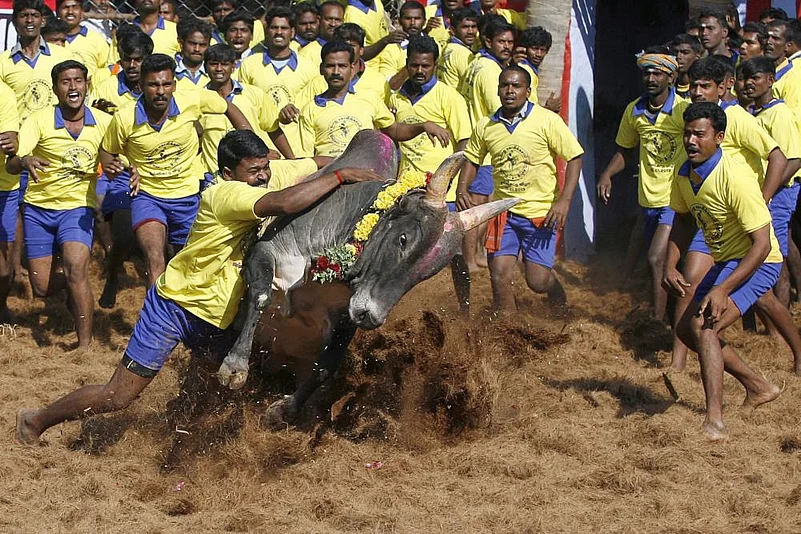What is abuse? Does it confer to only a human centered definition or does it have a wider array of definitions that include all the Flora and Fauna of earth? The question when answered in a moralist absolute sense, will say YES! Every creature should be protected and prevented from abuse that causes mental/physical harm. But then again the culture and environment we live in are not that simple to deduce. When there is a philosophy of moral absolutism there is another called moral relativism, which asks us to treat every argument in a contextual scenario.
Jallikattu, a traditional and ancient cultural practice of Tamil Nadu (Not to mention the numerous transformations it has gone through) or to put it in a more political way, one of the cultural practices of the Dravidians came into limelight lately for all the wrong reasons. There was protest from PETA and animal lovers to stop the abuse on the cattle that was used for this traditional sport organized during Pongal. When we see these posts about abuse of animals in social media like Facebook, we feel an immediate sense of sympathy for the animals. This was the same case when there was the issue of stray dog culling that happened in Kerala. But what should be the real scale of measuring all this violence/abuse done on animals? Does it have to be viewed in a strict sense of universal morality or do we have to dig deeper and unearth some basic facts about us humans.
Advertisement
Let’s face it! We are not a non-violent breed of species. We kill, we abuse and we exploit most of the species on earth. We just fail to accept this mere fact that nature and its methods always work on a ‘survival of the fittest’ method no matter how sanely we act about it. Those who criticize Jallikattu will be petting dogs, cats and numerous other animals which according to them is not abuse or violence on that animal but if we view it within a universal context then that also is a form of violence. Robbing an organism the right to live in its natural circumstances and then keeping it domesticated to overcome a psychological sense of loneliness is a form of violence. Then these animal lovers who protest against abuse will buy cattle meat to satisfy their palettes once in a while (or maybe daily). Now, there are people who say they are vegan because they cant stand the violence done to animals. For them, they are ignorant about the proven fact that plants are also aware and just because plants can’t vocally express it doesn’t mean they don’t realize it when you are chopping and eating them.
Advertisement

This binary view of cultures, of seeing one more barbaric than the other is simply a hypocritical perspective to provide sanctity to one’s own belief system and to blame the other culture which is alien to us. It is also a form of racism, to judge the culture and tradition of others without trying to contextually analyse it. People of North-East are looked down upon by the dominant Indian culture for their ‘weird’ food habits. South Indians are ridiculed for their ‘obsession’ over Sambhar, curd, etc, North Indians for their love of aloo (potato) and pyaaz (onion). The irony of the matter is if we Indians are not able to understand this mere fact then who else will? We have been living amidst this plethora of cultural diversity and still we are not able to tolerate and appreciate other cultures and their traditional practices.
At the same time, looking at the other side of the argument, we should not blindly accept everything in the name of culture. Traditions should be criticized and amendments should be made through a method of positive resistance and not by crucifying or targeting. Jallikattu in its most recent form is a sport where a bull is being tamed by a charging mob (yes it’s not the bull that is charging here, it’s definitely the mob that runs behind it!). It is simply put as a show of hyper-masculinity, a pagan symbolism about the victory of man over the beast. What is concerning here is the methods that are followed in order to conduct the whole sport in its most entertaining prospects. How can we make these methods more inclusive? A practicing veterinary expert from a committee formed by the government for Jallikattu can examine the Bull right before the sport starts. Abusive practices can be restricted and safety of the participants and even the spectators can be made more stringent. If the sport really fosters the idea of ‘Bull Hugging’ as some protestors claim then why would they not agree to such a step?
Advertisement
Chennai marina beach has become a battle ground where protestors were allegedly lathi- charged by the police and quite shockingly there were some video footage in the television that show policemen themselves setting fire to autorickshaws. Socially, this issue has lead to a corruption of democratic ethics where even the protestors do not know what to fight for, the scenario is changing from an inspiring civil movement to a senseless show of violence and chaos. This Cultural Puritanism that the political parties are trying to inject into the minds of Tamilians (mostly the youth) is escalating to radical levels of fanaticism.
Advertisement
As we have seen in various other instances, the issue is moving into a reductionist mode of a mere YES or NO! The supporter and the opposer, while nobody is trying to clear out the foggy air of half-baked information and misconceptions flourishing at both ends of the argument and online social media and chats are major culprits in this. As Shakespeare points out in Julius Ceasar “the mob is fickle-minded”, indeed! We just want to hear what we want to hear and we hate what doesn’t sound right to us, what doesn’t fit into our beliefs, what pokes our little bubble of Identity, what makes us look like victims. But at the end, will these ‘opinions’ and ‘rigid moral actions’ help us build a better future for us and the animals on this planet? It’s time to loosen our pants of polarized outlooks and breath. As a new ordinance is passed lifting the ban of Jallikattu, we should wait and see what other movements will spring up across the nation and how the war between neo-liberalists and traditionalists take unprecedented turns in this game where ultimately none will turn victorious.
Advertisement
The author is a PhD Scholar at Pondicherry University.
Disclaimer: The views expressed in this article are those of the author.




















